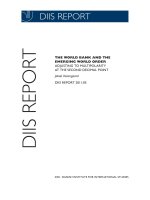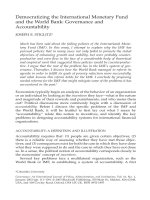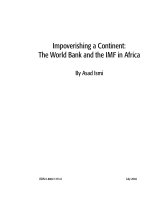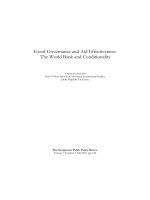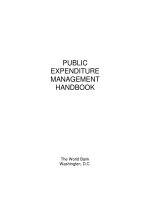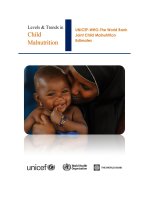The world bank group (wbg)
Bạn đang xem bản rút gọn của tài liệu. Xem và tải ngay bản đầy đủ của tài liệu tại đây (6.55 MB, 40 trang )
uthorized
Public Disclosure Authorized
Code
of Ethics
Public Disclosure Authorized
Public Disclosure Authorized
2
i
MESSAGE FROM
The World Bank Group President
In the challenging, complex global environment in which we work, it is critical that
we live by our values. The World Bank Group’s Core Values—impact, integrity,
respect, teamwork, and innovation—should guide our decisions and actions as we
pursue our mission of alleviating poverty and boosting shared prosperity.
Our Code of Ethics is an important resource for all staff. It articulates norms and
behavioral expectations that the World Bank Group has of our staff—and that we
should have of ourselves and one another—in our interactions with colleagues,
clients, partners and communities at large. Each of us has a responsibility to be
familiar with the Code, and to make sure we continually strive to embody the
principles it lays out.
If we prioritize our values, we will build a World Bank Group workplace culture
that lasts—one of integrity and respect, which encourages teamwork and
innovation, so that we can achieve impact at the highest levels.
David Malpass
President, World Bank Group
i
MESSAGE FROM
The Chief Ethics Officer
The World Bank Group Code of Ethics was adopted in 2020 and is built on our Core
Values of impact, integrity, respect, teamwork and innovation. These values guide our
day-to-day work and all the decisions we undertake at the WBG. These values also
guide how we work to achieve the WBG’s mission.
This Code of Ethics is a key tool to becoming a values-based institution. It is complementary to our Staff Rules, raising our accountability beyond mere compliance with
the rules; it is a set of principles designed to guide us to do the right thing. Each and
every one of us matters. Each and every one of us, without exception, is responsible
and accountable towards our institution and clients.
Our Core Values and the Code are unique. They were developed directly from staff
inputs, collected through face-to-face discussions and on-line engagement open to
all staff members of the organization. They reflect the voices of staff on how we can
shape the culture we wish to see.
And if we ever find ourselves in a difficult situation or dilemma, we must reach out for
advice and guidance. EBC is always ready to provide support, together with the
WBG’s internal justice system.
Jorge Dajani
Chief Ethics Officer, The World Bank Group
ii
MESSAGE FROM
The Chair of Staff Association
A key element of the mission of the Staff Association is to build community and
foster a sense of common purpose among staff. Ethical behavior is at the heart of
this community. It’s what keeps it strong and inclusive, and what makes us proud to
work here.
The Code of Ethics reminds us of the values we all need to strive for — what we
collectively and individually need to demonstrate and promote in our professional
and even personal lives. It operationalizes our core values and articulates how we
work together and interact. At the same time, the Code helps us identify and call
out behaviors that are inconsistent, a key element of accountability.
The Staff Association worked closely with EBC in developing the first statement of
Core Values, and we continue to work closely with EBC and other stakeholders to
revise and update the document to reflect further thinking and discussion on issues of
importance to staff throughout the institution. Work done by the Bank’s Anti-Racism
Task Force, as well as ongoing discussions about the importance of managerial
accountability and the fear of retaliation among staff, have inspired some revisions
to the current Code of Ethics. This is a living document, and we will continue to review
and revise it to better reflect our core values. But committing these values to paper is
only the first step. It is then up to each and every one of us to uphold these values
and translate them into action.
Talib Ismail
Chair, World Bank Group Staff Association
iii
impact
integrity
respect
teamwork
innovation
iv
TABLE OF CONTENTS
Message from the President . . . . . . . . . . . . . . . . . . . . . . . . i
Message from the Chief Ethics Officer . . . . . . . . . . . . . . . ii
Message from the Chair of Staff Association . . . . . . . . iii
The Code: Purpose and Scope . . . . . . . . . . . . . . . . . . . . . . 2
Impact . . . . . . . . . . . . . . . . . . . . . . . . . . . . . . . . . . . . . . . . . . . . 4
Integrity . . . . . . . . . . . . . . . . . . . . . . . . . . . . . . . . . . . . . . . . . 8
Respect . . . . . . . . . . . . . . . . . . . . . . . . . . . . . . . . . . . . . . . . . . 16
Teamwork . . . . . . . . . . . . . . . . . . . . . . . . . . . . . . . . . . . . . . 24
Innovation . . . . . . . . . . . . . . . . . . . . . . . . . . . . . . . . . . . . . . . 28
In Closing: Using the Code and the values
to guide you . . . . . . . . . . . . . . . . . . . . . . . . . . . . . . . . . . . . . . 31
1
The Code:
Purpose and Scope
The World Bank Group (WBG) is one of the world’s largest sources of funding and
knowledge for developing countries. Our mission is to reduce poverty and increase
shared prosperity across the globe. As a leader among the international development community, how we accomplish our mission is as important as the mission
itself. Our values guide everything we do, everywhere we work. They remind us —
and anyone working with us — of who we are, what we stand for, and how we get
things done. They enable us to hold ourselves to the highest standards. They are our
inspiration and our guide.
2
This document, the World Bank Group Code of Ethics (“the Code”), is
derived directly from our core values. The Code sets out broader principles
that align to our values. It describes the ethical norms and behaviors that
the WBG expects from each of us as staff, and that each of us should
expect of ourselves, from one another, and from the Institution. Throughout the document, links to appropriate resources that provide more detail
are provided. The Code should be considered a living document that may
be reviewed and updated over time.
The Code is complementary to our Staff Rules. The Staff Rules provide
more detail on many of the topics addressed in the Code and are the basis
for determining misconduct and disciplinary sanctions.
WBG STAFF RULES
All staff must adhere to our Staff
Rules and relevant policies and
Who is this Code for?
procedures within the WBG’s
The Code applies to all WBG staff — including regular staff, consultants
and temporaries — and it is relevant to anyone who contributes to the
work of the WBG. Although many clients, partners, vendors or representatives of civil society may have their own codes or principles, the WBG
expects that anyone who is involved in our activities act in ways that are
consistent with our Code.
work. Violations of the Staff Rules
Within the WBG, everyone, everywhere — regardless of role or seniority
— should be familiar with the Code, uphold the values and demonstrate
the behaviors articulated in the Code.
Policies and Procedures Frameare serious and can result in
disciplinary sanctions.
You can go to the Resource
Page to access Policies and
Procedures Framework and
Staff Rules.
What if the Code sets out principles different to my
national law or custom?
WBG staff work in over 130 locations across the globe, with a wide range
of cultural frameworks. As such, some practices that may be considered
normal or legal in one location may not meet the standards we strive for
at the WBG. Staff should follow this Code where it differs from national
law or practice, unless national law holds individuals to a higher standard
or unless it is illegal to do so.
3
4
Impact.
We use our convening power,
commitment to excellence, and deep
professional expertise to facilitate
outcomes that reduce poverty and
improve people’s lives.
We stay at the
cutting edge in our
fields of expertise.
We leverage the
best knowledge
and expertise
available, from
within and outside
the WBG.
We make decisions
that prioritize
impact over
politics or process.
We partner with
our clients with
flexibility and
agility.
We help our clients solve their greatest
development challenges.
5
Impact
Impact is directly linked to our mission of reducing poverty and increasing prosperity, and we approach our work with the goal of achieving the
highest possible impact. We leverage the resources available in efficient
and effective ways and, at times, make decisions that may not be easy
or popular. We change and adapt our approaches to thinking, design and
implementation as required to respond to clients’ development needs.
We stay at the forefront of our field by learning, developing, and implementing best practices, consistent with our mandate. We partner with
external organizations, foster communities of practice, and bring together
robust professional networks, both internally and externally.
Our dedication to excellence means that we are prepared to take informed
risks in order to provide the most appropriate solutions for our clients,
rather than only relying on what has worked in the past. We look for new
ways of working whenever it improves our relevance, effectiveness, and
efficiency.
We welcome diversity of views, recognizing that perspectives of staff from
different backgrounds (see the list of diversity on page 19) as well as
contract status, and geographic location — leads to greater impact in our
work through higher levels of engagement and creativity.
6
We embrace change and remain adaptable and nimble. We adopt new
technologies and approaches when they improve our contribution to
development. We seek objective and well-defined evaluations of our work
and its impact. When results do not meet our expectations, we do not
make excuses, but rather, make changes to our approach.
THE ENVIRONMENTAL
& SOCIAL FRAMEWORK
AND IFC PERFORMANCE
STANDARDS
All WBG projects must adhere to
guidelines on environmental and
social standards.
To learn more, go to the
Resource Page.
We strive for positive impact on the environment and on Indigenous
Peoples and local communities — whose perspectives we seek through
meaningful consultation — in our operations, by prioritizing projects that
tackle issues of climate change, environmental and social sustainability,
fragility, and gender-based violence.
We respect human rights and do not condone forced, bonded or child
labor. In addition, we strive to apply environmental and social safeguards
and standards in everything we do. We take responsibility for the impact
of our actions on our local environment and communities, and we look for
ways to minimize waste and make positive differences wherever we can.
7
8
Integrity.
We hold ourselves,
our clients, and our
partners to the
highest standards
for responsibility,
accountability,
and quality.
We take
ownership for
our actions and
decisions.
We put the
interests of the
WBG and our
clients first.
We ensure
our words are
consistent with
our actions.
We communicate
with honesty and
transparency.
We question
actions that are
inconsistent with
our values.
We do what is right.
9
Integrity
WBG staff are expected to demonstrate personal commitment to
ethics and professionalism in carrying out our duties. This applies to
how we work with one another within the WBG, and with our clients,
vendors and partners. We look to our clients, vendors and partners to
uphold the same standards of ethics and professionalism.
WHAT IS A PERSONAL
CONFLICT OF INTEREST?
A personal conflict of interest
As staff, we commit to adhering to the WBG’s rules and regulations, and
to abiding by the laws of the countries where we reside or operate. We
fulfill our legal and personal obligations.
refers to a situation where our
We do not accept, offer or facilitate improper payments or bribes.
duties in an impartial manner.
We prioritize the interests of the WBG and our clients above our own
personal gain. This includes protecting the reputation of the WBG. We are
truthful in all aspects of our work, including administrative, corporate, or
operational, and in acknowledging and disclosing inaccuracies or discrepancies when we are aware of them. We mitigate personal conflicts of interest
that include (but are not limited to) asset ownership, business relationships,
outside activities, political interests, personal and family relationships, and,
when necessary, seek guidance from the Ethics and Business Conduct
Department (EBC). We are careful with the resources entrusted to us, and
we do not use our positions at the WBG for personal gain.
Building and preserving trust among our colleagues and with our clients is
essential in acting with integrity. We aspire to do what we say, to deliver
what we promise, and to be transparent and pragmatic about our commitments. We share relevant information clearly, accurately, and honestly,
and we are accountable for the intention behind our actions and words.
We are willing to make the right decisions even when it may be difficult or
10
personal interests may interfere
with our ability to perform official
Whether conflicts are real or
perceived, these situations need
to be managed in order to protect
our individual and the WBG’s
integrity, independence and
reputation.
unpopular to do so, and we are honest and truthful about how decisions
are made.
When decisions result in unplanned or undesired outcomes, we do not
hide the outcomes or assign blame. Rather, we take accountability,
acknowledge mistakes, and work towards constructive remedies. We
are aware that our actions and words can be perceived differently, and
self-correct when needed.
Any WBG staff member who suspects or is made aware of a misconduct
by another staff member, client or partner is encouraged to raise it with
their Manager or report it to EBC or INT as appropriately described under
Staff Rule 3.00 and Staff Rule 8.01. Issues that staff are encouraged
report to EBC include, but are not limited to, harassment (including sexual
harassment); retaliation; abuse of authority; discrimination (including
racism and racial discrimination and discrimination based on other personal attributes — see full list of diversity on page 19); theft; and abuse or
misuse of Bank Group funds related to travel, benefits, allowances, P-Card,
petty cash, or property. Issues that can be reported to INT include, but are
not limited to, sanctionable practices (corruption, fraud, collusion, coercion,
and obstruction) and abuse of position for personal gain.
A staff member has a duty to report suspected fraud or corruption to their
line management or INT. A manager who suspects or receives a report of
suspected fraud or corruption has an obligation to report it to INT. A
manager who suspects or receives a report of suspected misconduct
described above (under EBC’s jurisdiction) has an obligation to report it to
EBC.
11
Integrity
Protection against retaliation
The WBG does not condone retaliation, which is defined as any form of
retribution or threat of retribution taken against an individual who engages
in one of the three following protected activities: reports an allegation of
misconduct to INT, EBC or a manager, cooperates with or provides
information in a related investigation, or uses any of the resources of the
WBG Internal Justice Services.
PROTECTION FOR
WHISTLEBLOWERS
The WBG protects “whistleblowing,”
which means we encourage staff
to report in good faith “suspected
misconduct that may threaten
12
Managers — including executive leaders, Directors and Managers
— have additional responsibility as role models to model what is
right, to regularly communicate with staff about the values and the
Code, and to ensure that staff have access to resources that support
staff to live by the Code. Managers are also expected to provide a
safe space for those who have questions and seek clarity, who are
overcommitted and need support, whose ideas may provoke controversy or who raise dissenting views. Staff who raise good faith
concerns about potential harassment, abuse of authority, discrimination or other inappropriate behavior are protecting the interests of
the WBG. As such, the WBG will make every effort to protect staff
from retaliation for reporting concerns in good faith.
the operations or governance of
While there are some actions and responsibilities that apply only to
tagged managers, the general principles of role modeling and
creation of an environment that is conducive to practicing the Code
apply to all those who have supervisory responsibilities over others or
a leadership role. Find out more in Leaders Guide to Code of Ethics
and other resources in the Resources Section.
sional considerations, and not on
the World Bank Group,” typically
linked to corruption or fraud.
Whistleblowers can expect the
same quality in their relationships
with their colleagues and Managers
after they have come forward.
Managers and colleagues should
continue to provide whistleblowers
with support, guidance, and
collegiality based solely on profestheir status as whistleblowers.
You can find link to Protections
and Procedures for Reporting
Misconduct (Whistleblowing) in
the Resource Page.
Q&As
Can I accept a gift offered by a client or
someone from a partner organization?
A. While the WBG recognizes that gifts may be part
of interactions with clients and partners, we need to
be aware of both the real and perceived potential
conflicts of interest that might arise. You may not
accept gifts, regardless of value, that could be perceived as intending to influence your work decisions,
or that could cause reputational harm to the WBG.
In exceptional cases, you may accept a gift, for
example, if the gift is presented in a public forum
and/or refusal would cause offense or embarrassment to the giver. In these cases, the gift may be
accepted on behalf of the WBG rather than in a
personal capacity. If valued at more than $100, the
gift would need to be declared to Global Corporate
Solutions (GCS). Gifts valued at less than $100 may
also be accepted so long as they do not otherwise
cause reputational harm to the WBG or create a
perception that it would influence your work decisions.
The cumulative value of all gifts from the same
individual or entity, however, cannot exceed $100 in a
12-month period.
If you have any questions related to the acceptance of gifts from vendors, please go to Resource
Page for the link to Staff Rule 3.01.
13
Integrity
Q&As continued
14
Can I help a friend or family member get a
job at the World Bank Group?
a reporting relationship and their duties are not likely
to bring them into routine professional contact.
A. As staff members of a publicly funded international
organization, we all have a role to play in ensuring
that employment decisions are made solely on the
basis of merit and not due to a personal or family
relationship. As such, you are not allowed to advocate
for your spouse, domestic partner or eligible close
relative who is applying for a job at the WBG. Your
immediate relatives — including a sibling, parent,
child, aunt/uncle, nephew/niece — may not be
employed at the WBG in any capacity. There is an
exception specifically for spouses and partners, who
can work at the WBG, provided that they do not have
As for friends, it would not be appropriate to advocate
for the hiring of individuals with whom you only have
a personal relationship and do not have a basis for
assessing their professional qualifications.
You can find the link to Staff Rule 4.01 on family
relationships in the Resource Page.
If I suspect misconduct, am I required to
report it?
A. Any staff member who suspects corruption or
fraud in WBG projects or activities is obligated to
report it to INT.
For other types of potential misconduct such as
abuse of authority, bullying or harassment, staff are
encouraged to report it to a Manager or to EBC. If
you are a tagged Manager, however, you are obligated
to report all suspected misconduct to EBC, whether it
is reported to you or you become aware of it in any
other way.
I recently shared with my manager a
concern that a colleague may be falsifying her travel claims, and that I reported
the matter to EBC. I now sometimes get
the feeling that my manager is treating
me differently since then. She has not
included me in a few meetings that included discussions of projects I work on.
And she has not invited me to our regular
one-on-one check-ins. I am afraid this is
affecting my ability to deliver my work
and potentially may impact my career
development long-term. What can I do to
make sure I am protected?
A. All staff are protected from retaliation under Staff
Rules 3.00 and 8.02. “Retaliation” can take many
forms including managerial decisions such as termination, non-renewal of contracts, denial of promotion,
exclusion from work, verbal and written reprimand,
and threat of retaliation. Staff who report suspected
misconduct or otherwise participate or provide
information in EBC or INT investigative proceedings
or use the Internal Justice Services are considered to
have engaged in a “protected activity” that triggers
these protections. This prohibition extends to retaliation against any person because such person was
believed to be about to report misconduct or believed
to have reported misconduct, even if such belief is
mistaken. These protections apply to all staff,
including short-term staff, as well as outside parties,
such as contractors and their employees, agents or
representatives, and any other persons engaged in
dealings with the WBG.
If staff are concerned that they may be experiencing
or will in the future face negative repercussions for
their involvement in a protected activity, they should
contact EBC, Internal Justice Services or Staff
Association. Retaliation is misconduct and may lead
to disciplinary sanctions if established. Where there is
a risk of retaliation, EBC can work with management
and HR to implement interim protections to safeguard the interests of staff members. Protective
measures can include monitoring for retaliation or
reprisal, or temporary reassignment of the affected
staff to another unit or manager based on agreement. Such measures as reassignment will be
implemented only with the staff members’ consent. In
certain circumstances, an alleged offender may be
placed on administrative leave. Where appropriate,
such as where a staff member who participated in an
EBC investigation has concerns and requests it,
EBC’s Anti-Harassment Coordinator (AHC) may raise
the concerns with the relevant manager and director,
remind them about prohibition against retaliation,
and monitor the situation.
15
16
Respect.
We treat everyone
with dignity and
compassion.
We embrace
diversity and
pursue inclusion of
backgrounds,
identities, cultures,
working styles and
perspectives.
We support the
work-life balance
of our colleagues
across the globe.
We apply policy
and standards
with fairness and
consistency.
We remain humble
in carrying out our
mission.
We promote
sustainable
solutions in our
operations and
in our work
environment.
We care for our people, our clients,
our partners, and our planet.
17
Respect
The WBG is inclusive and welcoming of differences. We take steps to
create a culture where we actively foster a sense of inclusion and
belonging. We listen to our staff, clients, and partners with open minds,
including those with whom we may disagree. We acknowledge that we
all have biases and flaws, and we recognize and overcome them to the
best of our ability. We treat others as they would like to be treated.
We seek objectivity and consistency in designing and implementing our
policies. This means recognizing and rewarding our staff based on merit, as
well as applying rules and policies with fairness and consistency for all staff.
This is especially relevant in all career defining decisions such as recruitment,
performance evaluation, assignments and re-assignments, and progression.
As WBG staff, we are mindful that we represent the organization at all
times, and therefore are expected to behave with professionalism,
courtesy, and tolerance when dealing with others. We approach our work
with humility; we listen carefully and speak kindly with colleagues, clients,
partners, vendors, other service providers and members of the public.
Though we are headquartered in the United States, we work all over the
world, and this requires us to be mindful of local customs, traditions and
different work cultures.
Go to Resource Page to find
the link to the WBG Anti-Racism
Task Force
WBG STATEMENT OF
COMMITMENT TO
DIVERSITY AND
INCLUSION
The WBG is committed to offering
staff a work environment that is
characterized by openness, trust,
We protect and nurture our collective and individual differences so that we
reflect the societies and the world we serve, make better decisions, and more
effectively meet the needs and expectations of our clients and stakeholders.
respect, creativity, motivation
We consider differences to be strengths, whether they are related to race,
ethnicity, culture, national/country of origin, ancestry, nationality, gender
our collective success.
and gender identity, sexual orientation, age, education, marital/family/
parental status, pregnancy, health status, disability, religion, political
18
THE WBG IS COMMITTED
TO FIGHTING RACISM
AND RACIAL
DISCRIMINATION
IN ALL ITS FORMS.
and innovation. Respecting and
valuing our differences is key to
Go to Resource Page to find
the link to the WBG Statement
of Commitment to Diversity and
Inclusion.
WBG DOES NOT TOLERATE
HARASSMENT OR
SEXUAL HARASSMENT
IN THE WORKPLACE
To learn about policy and
measures being taken to prevent
and address these issues, go to
the Resource Page.
affiliation, native language, social and economic status or any other
characteristic.
Respect extends to the demands we place on one another. We recognize
that we all have both professional and personal responsibilities; we have
friends and families and are all members of local communities. As such,
we help one another to preserve these aspects of our lives and support the
mental and physical health of those with whom we work to the best of our
ability. In practical terms, this means we work to find mutually convenient
times to convene and respect our colleagues’ personal boundaries and
time spent away from the office as much as possible.
Our Diversity — Race, ethnicity, culture,
national/country of origin, ancestry,
nationality, gender and gender identity,
sexual orientation, age, education, marital/
family/parental status, pregnancy, health
status, disability, religion, political
affiliation, native language, social and
economic status or any other characteristic.
19


